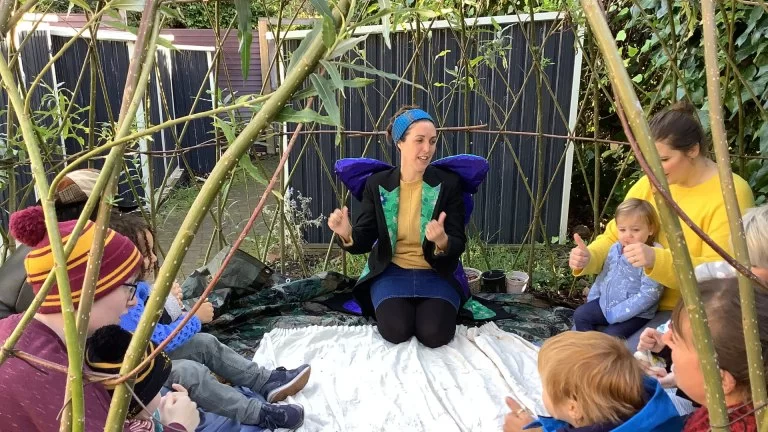Discover the benefits of outdoor storytelling for kids. Learn how outdoor environments enhance creativity, social skills, and cognitive development in children through the power of storytelling.

The Benefits of Outdoor Storytelling for Kids: Boosting Creativity and Connection
Outdoor storytelling is an engaging and enriching experience that combines the natural world with the power of imagination. For kids, storytelling is more than just entertainment—it’s a way to develop essential cognitive, social, and emotional skills. When paired with outdoor settings, storytelling becomes an even more immersive and stimulating experience. In this article, we explore the numerous benefits of outdoor storytelling for children and why it’s an activity worth incorporating into your routine.
- 1. Understanding Outdoor Storytelling
- 2. Enhancing Creativity and Imagination
- 3. Developing Social Skills Through Storytelling
- 4. Improving Cognitive Development
- 5. How Pine Cliff Resort Can Inspire Storytelling
1. Understanding Outdoor Storytelling
Outdoor storytelling is the act of telling and listening to stories in natural, outdoor settings. Whether it’s a forest, park, or garden, the outdoors offers a rich and dynamic environment that can enhance the storytelling experience. Children are naturally drawn to the sights and sounds of nature, and when storytelling is integrated with outdoor play, it becomes a multi-sensory experience that captivates their attention.
What makes outdoor storytelling unique is the connection it fosters between the natural world and the stories being shared. The natural surroundings often serve as a backdrop for the narrative, adding depth to the storytelling and making the experience more memorable. Kids can envision the characters and scenes within the environment, making the story come to life in a way that a classroom or indoor setting might not be able to replicate.
2. Enhancing Creativity and Imagination
One of the greatest benefits of outdoor storytelling is its ability to spark creativity and imagination in children. When kids hear stories in outdoor environments, their minds are encouraged to wander, creating new ideas and narratives. The variety of sights, sounds, and textures outdoors enhances the imagination, helping kids to visualize and build upon the story in unique ways.
For example, while listening to a tale about a magical forest or a hidden treasure, children can envision the landscape around them as part of the story. A simple tree might become a castle in the sky, or a creek could turn into a river leading to unknown lands. This level of engagement helps children think outside the box and pushes the limits of their creativity, which is vital for their development.
3. Developing Social Skills Through Storytelling
Outdoor storytelling also provides an opportunity for children to develop and refine their social skills. Sharing stories in a group setting encourages kids to listen to others, respect differing viewpoints, and express their thoughts and ideas clearly. As they engage in interactive storytelling, children also learn how to collaborate, negotiate, and work together to bring a story to life.
3.1 Promoting Active Listening
Listening is an essential social skill, and outdoor storytelling fosters active listening in children. As children listen to stories in nature, they must pay attention to details in the narrative and connect the story’s elements to their environment. This enhances their ability to focus and listen attentively, a skill that can translate to improved communication in everyday life.
3.2 Encouraging Empathy
When children hear stories that feature diverse characters or complex emotional experiences, they begin to develop empathy. Understanding characters’ feelings and motivations helps children relate to others and strengthens their emotional intelligence. These experiences are especially impactful in outdoor settings, where kids feel a sense of connection to the natural world and the characters within the story.
4. Improving Cognitive Development
Beyond social and emotional benefits, outdoor storytelling plays a critical role in enhancing cognitive development. The combination of nature and storytelling can stimulate a child’s brain in powerful ways, leading to improvements in memory, problem-solving, and critical thinking skills.
4.1 Memory Retention
Studies have shown that children are more likely to retain information when it’s presented in an engaging, multisensory environment. Outdoor storytelling, with its visual and auditory stimuli, creates a rich learning experience that can boost memory retention. As children hear stories in a dynamic outdoor setting, they are more likely to remember the details of the plot, characters, and setting.
4.2 Enhancing Problem-Solving Skills
Many stories involve challenges that the characters must overcome. When children listen to these stories, they are encouraged to think critically about how to solve problems and navigate obstacles. This strengthens their problem-solving abilities, which are crucial for success both in and outside the classroom. Moreover, outdoor settings often present real-life challenges, such as navigating terrain or working together as a group, which further enhances these skills.
5. How Pine Cliff Resort Can Inspire Storytelling
At Pine Cliff Resort, the natural surroundings provide the perfect environment for outdoor storytelling. The beautiful landscapes, tranquil forests, and picturesque lakes offer countless opportunities for immersive and imaginative storytelling. Whether it’s gathering around a campfire for an evening story or embarking on an outdoor adventure with a narrative twist, the resort encourages creativity and exploration through storytelling.
Pine Cliff Resort offers a peaceful and inspiring backdrop for parents and educators looking to engage children in outdoor storytelling. By integrating nature into the narrative, kids can experience firsthand the power of storytelling while building essential skills. Plan a visit today to immerse your kids in a world where stories come to life in the great outdoors.
SE Arm Inlet
Yellowstone National Park, WY 82190, USA
Visit Location PageRanney Knob Area
Washta, IA 51061, USA
Visit Location Page